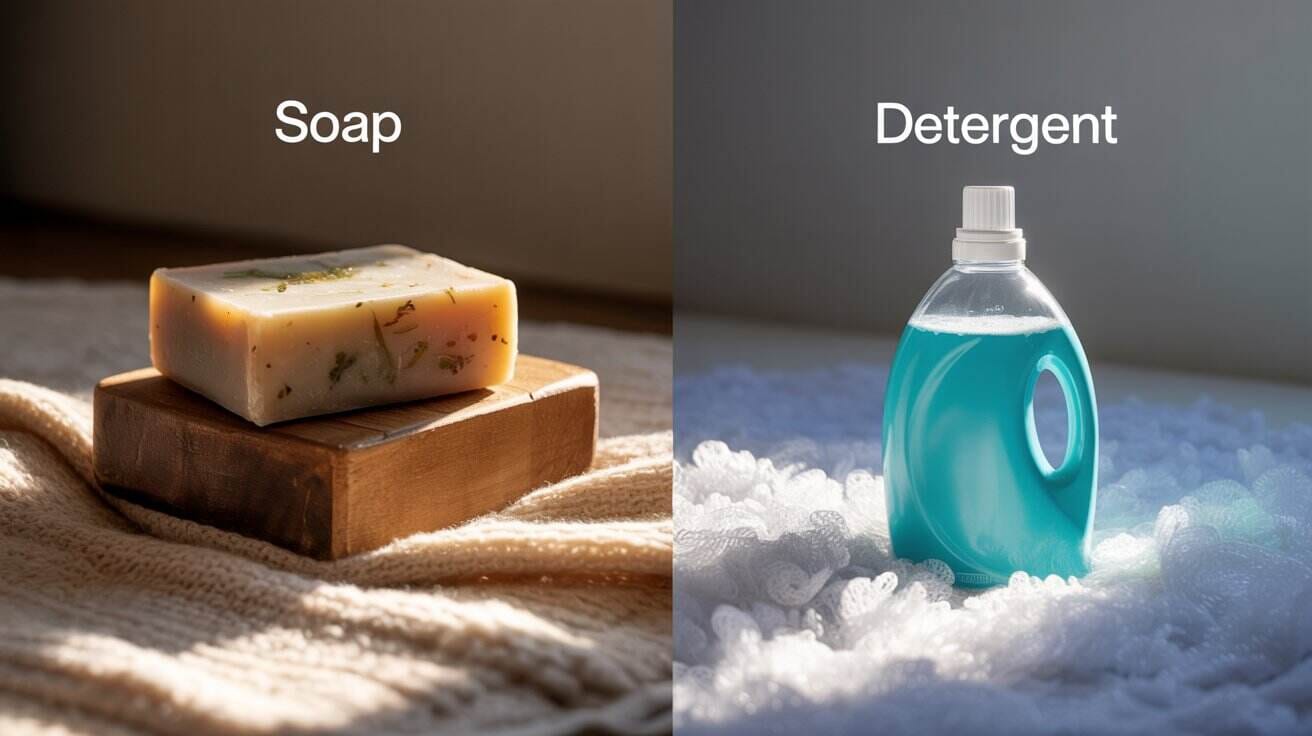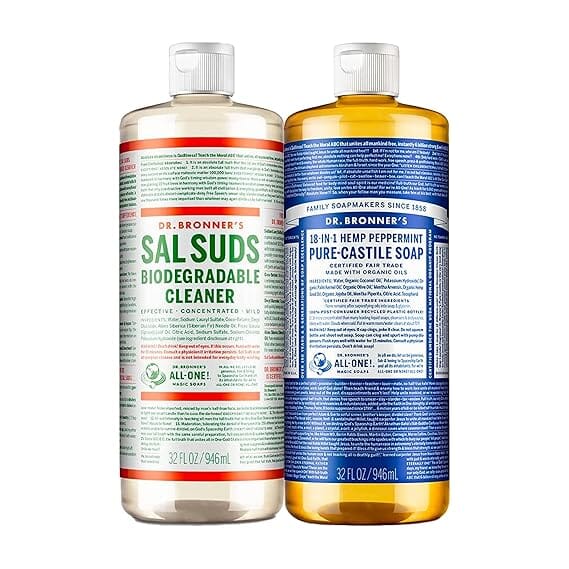Have you ever noticed that washing your hands with water doesn’t clean them? That’s because water alone can’t remove oil or grease. This is where surfactants come in. Soap and detergent are both surfactants. They help break the surface tension of water so it can mix with oil and dirt. Without them, water would simply roll off the oil without cleaning anything. Soap and detergent are both used for cleaning. But they are not the same. Many people think they work the same way. In truth, they are made from different things. They also work better in various situations. In this article, you’ll learn the key differences between soap and detergent. This will help you choose the right one for your needs.
Table of Contents

What Is Soap?
Soap is a natural cleaning product that mixes fats or oils with a strong base like lye. Lye usually refers to sodium hydroxide (NaOH) or potassium hydroxide (KOH). This process is called saponification. Common ingredients in soap include animal fat or plant oils (like coconut or olive oil), water, and lye. Sometimes natural scents or essential oils are added. Soap works by breaking down grease and dirt. Its molecules have two ends; one attaches to water, and the other attaches to oil. This helps lift oil and dirt from surfaces so they can be washed away with water.
What Is Detergent?
Detergent is a man-made cleaning product created using chemical compounds, not natural fats. It is designed to clean more effectively in hard water and remove tough stains. Common detergent ingredients include synthetic surfactants, enzymes, fragrances, and sometimes bleaching agents. Detergent molecules work like soap; one end sticks to water, and another grabs onto oil and dirt. This helps break down grease and lift it away so water can wash it off. Unlike soap, detergents are made in labs using petroleum-based chemicals, making them more powerful but less natural.
Soap vs Detergent
Both soap and detergent clean by doing the same basic job. They are surfactants, which means they help water mix with oil and dirt. This makes it easier to wash everything away. But the way they are made, how they affect the environment, and how well they work in different conditions are all different.
Here’s a quick breakdown:
Soap: Made by mixing natural oils or fats with an alkali like sodium hydroxide (for solid soap) or potassium hydroxide (for liquid soap).
Detergent: Made in labs from chemicals that may come from natural or petroleum-based sources. Detergents are usually more complex and work better in many situations, especially in hard water.
Why Use Detergents?
Detergents are made to clean more effectively than regular soap. They work well in both soft and hard water, making them useful in many places. Detergents can remove grease, stains, and dirt quickly. They are strong enough for laundry, dishes, and household cleaning. Unlike soap, they don’t leave a film or scum behind. Many detergents also include extra ingredients like enzymes and brighteners to boost cleaning power. This makes them a popular choice for modern cleaning needs.
Soap vs. Detergent: Environmental Impact
Soap and detergent may clean well, but they affect the environment in different ways. Soap is usually made from natural materials, so it breaks down easily in nature.
Detergents are often made from chemicals that can harm water and soil. Some may take longer to break down and can pollute rivers and lakes. Knowing the impact of each can help you make a better, eco-friendly choice.
Is Soap Always Better?
Soap is natural and gentle, which makes it a great choice for many people. It’s better for the environment and usually safer for sensitive skin. But that doesn’t mean it’s always the best option. In some cases, like hard water or tough stains, detergent can work better. The right choice depends on what you need to clean and your personal preferences.
Both soap and detergent involve fascinating chemistry, just like antimatter! If that sparks your curiosity, check out Is Antimatter Dangerous? What Scientists Just Revealed
Quick Comparison Chart: Soap vs. Detergent
| Feature | Soap | Detergent |
|---|---|---|
| Source | Natural (fats/oils + lye) | Synthetic (petroleum-based chemicals) |
| Form | Mostly solid (bars), some liquid | Liquid, powder, pods |
| Water Type | Works best in soft water | Works well in hard and soft water |
| Eco-Friendliness | Biodegradable and eco-friendly | May contain non-biodegradable substances |
| Skin Sensitivity | Gentle on skin | May irritate sensitive skin |
| Cleaning Power | Good for light cleaning | Stronger for tough stains |
| Residue | May leave scum in hard water | No residue left behind |
| Cost | Usually affordable | Varies by brand and type |
| Common Use | Bathing, handwashing | Laundry, dishes, heavy-duty cleaning |
Which Should You Choose?
The best choice depends on what you’re cleaning.
If you want a natural, eco-friendly option for your skin, soap is a great choice. It’s gentle and good for daily use.
Detergent works better if you need something strong for laundry, dishes, or greasy messes. It’s more powerful and works in all water types.
So, choose soap for personal care and light cleaning.
Choose a detergent for heavy-duty cleaning and hard water.
🌿 Our Top Picks for Everyday Cleaning
Looking for something safe, effective, and eco-friendly?
Here are two products we trust and recommend:

🧼 Dr. Bronner’s Pure-Castile Liquid Soap – Peppermint (32 oz)
A natural, gentle soap made with organic oils. Use it as body wash, face wash, hand soap, or even for household cleaning.
✅ Vegan • Cruelty-Free • Non-GMO • Multi-use
💬 “Smells amazing and lasts for months, worth every drop!”
🧽 Dr. Bronner’s Sal Suds Biodegradable Cleaner
A concentrated, all-purpose detergent that’s tough on dirt but kind to the environment. Perfect for laundry, dishes, and more.
✅ Biodegradable • Powerful • Safe for septic systems
💬 “One bottle cleans my entire house super efficiently!”
👉 Tap the links to check current prices and reviews on Amazon.
Frequently Asked Questions (FAQs)
Q1. Is Dawn dish soap considered a detergent?
Yes. Dawn's ingredient does not behave like an actual soap. It includes substances that cut grease, eliminate food leftovers, and are successful in hard water. Dawn works better on grease than most, but its composition differs from natural soap.
Q2. What is the difference between a soap and a detergent?
Soap is made by reacting natural fats or oils with an alkali (like sodium hydroxide). It’s biodegradable and gentle on the skin.
Detergent, on the other hand, is usually synthetic, made from petroleum or plant-based chemicals. It's designed to work in all water types and is often stronger for tough cleaning jobs.
In short: Soap = natural + skin-friendly, Detergent = synthetic + heavy-duty.
Q3. Does soap count as a detergent?
Not exactly.
While both soap and detergent are surfactants (they help water remove dirt and oil), soap is not technically a detergent. People make soap through a natural process using fats and alkali, whereas detergents are often synthetic and engineered for stronger or broader cleaning.
Soap = natural surfactant
Detergent = synthetic surfactant
Q4. Can you see detergent as soap?
Not really.
Even though detergents and soaps do similar jobs cleaning, they are chemically different. Natural oils and alkali create soap, while manufacturers typically synthesize detergents and add chemicals to improve their performance.
So, while detergents can act like soap, they are not the same and shouldn’t be confused.
Q5. Is it ok to wash your face with detergent?
No, you shouldn’t use it in that manner.
Most dish, laundry, and floor detergents have effective chemicals that may harm your skin by stripping its oils, causing dryness, infection, or allergic responses.
You must only wash your face with a moderate, pH-balanced cleaner or a natural cleaning soap made for skin care.
